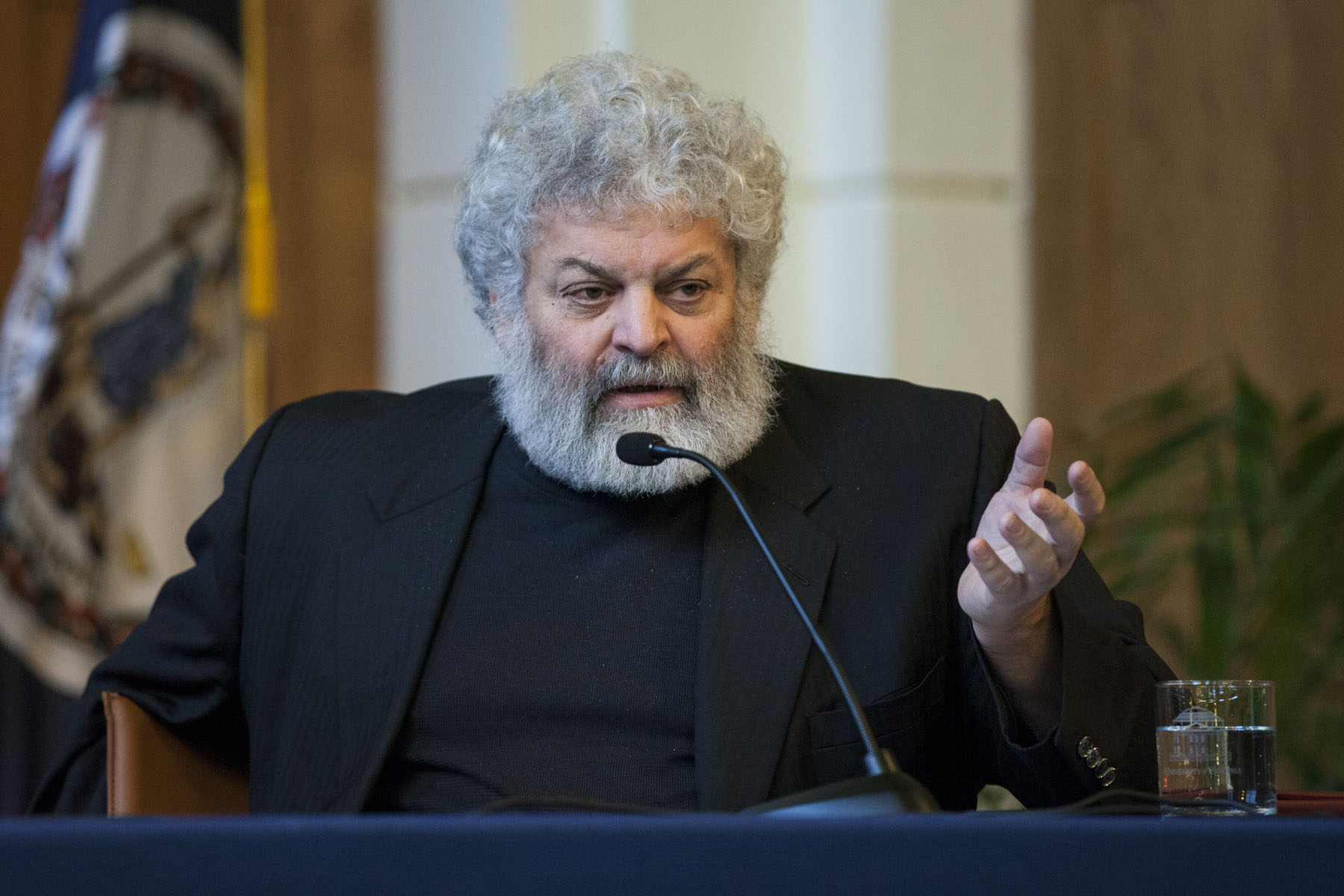Countless news stories are dedicated to ethical lapses by leaders, from elected leaders caught cheating on spouses to business leaders indicted for insider trading, Ponzi schemes or cooking their books. So, why do leaders act unethically?
Two eminent scholars took on those questions Tuesday at the University of Virginia’s Frank Batten School of Leadership and Public Policy in the inaugural event of a new leadership speaker series.
The scholars – Max H. Bazerman, Jesse Isidor Straus Professor of Business Administration at Harvard Business School, and R. Edward Freeman, a University Professor at U.Va. and Elis and Signe Olsson Professor of Business Administration at the Darden School of Business – approached the question from different angles. Speaking to an audience of more than 100 packed into Garrett Hall’s Great Hall, Freeman reasoned philosophically, while Bazerman drew on his behavioral science research.
Their approaches are complementary, Freeman said. Just as Sigmund Freud’s observation of his patients and their dreams gave Freud grist to think more conceptually about humans’ true nature, and helped him reach his great insight that we don’t always know what is in our hearts, the scholarly discussion of ethics – a conversation about how we should live – must build on the “fine-grained” psychological research and behavioral observation being done by scholars like Bazerman, he said.
Freeman explained how different philosophical conceptions of leadership come to differing conclusions about why leaders act unethically. According to Plato, leaders are unethical because they make mistakes or lack the proper skills. Aristotle disagreed; he ascribed ethical lapses to competing motivations or weakness of will, such as when someone resolves to stop smoking, but fails to do so.
“Aristotle is the father of the behavioral approach,” Freeman said, “because he understood that people are pretty complicated.”
Today, unethical behavior is often rooted in a very narrow framing of leadership, envisioning leadership as amoral, Freeman said. When leaders say things like “this is a business decision,” that “typically means ‘I’m doing this for some role that I play. It’s not me.’ Framing leadership in this non-holistic, non-human way leads to a lot of the unethical behavior that we see.”
Bazerman presented an overview of his research findings about “bounded ethicality” – the systematic and predictable ways in which humans act unethically beyond their own awareness, as he put it.
His behavioral research has uncovered many reasons why leaders come up short.
For instance, people are busy and have limited awareness beyond their immediate focus, a notion he demonstrated by playing an 18-second video and asking the audience to count the number of times a basketball is passed among five people moving in a circle. By focusing on counting, most people failed to see a woman with an umbrella who calmly walks across the scene.
Such behavioral science research aims to do more than just help people think more clearly about ethical dilemmas, Bazerman said. It also may help people “simply move up to the ethical standards an individual would endorse with greater reflection.”
Leadership occurs when leaders confront tough problems and make changes despite opposition, he said. “Obvious as that sounds, many times we fail to do that.”
The event was co-sponsored by the Batten School and the Darden School’s Initiative for Business in Society, often called IBiS, where Freeman is academic director. It launched a new leadership speaker series with a theme of “Can Anyone Lead From Anywhere? ... and other Big Questions about Leadership.”
The series was created by a new interdisciplinary faculty working group on leadership, formed this spring to bring together the many different parts of the University that focus on leadership in various contexts, from education, nursing and business leadership; to the study and training of state and local elected leaders by the Sorensen Institute; to the Miller Center’s renowned study of the American presidency.
Event moderator Ben Converse, an assistant professor of public policy and psychology at the Batten School, said Freeman and Bazerman were particularly fitting choices for the inaugural event.
“Each of them as individuals are practically pan-University interdisciplinary efforts, on their own,” he said. “The number of appointments and affiliations they each have are astounding. Between the two of them they have connections to a business school, a policy school, religious studies department, psychology department and affiliations with centers on business ethics, applied ethics, negotiations and others.”
The faculty working group on leadership – with 30 faculty members representing eight of U.Va.'s 11 schools, along with the Miller Center and the Sorensen Institute – is co-chaired by Eric Patashnik, a professor of politics and public policy, and Tom Bateman, Bank of America Professor in the McIntire School of Commerce.
The speaker series will have another talk in the spring, Converse said, tentatively scheduled to discuss whether women must lead differently than men.
Media Contact
Article Information
November 28, 2012
/content/series-inaugural-event-explores-why-leaders-go-ethically-astray

